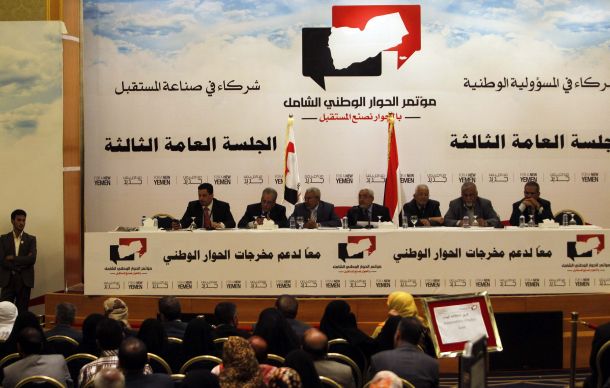
Delegates attend the third general plenary session of Yemen’s National Dialogue conference in Sana’a on October 27, 2013. (Reuters)
Sana’a, Asharq Al-Awsat—Yemen took a significant step towards a comprehensive settlement on the Southern Issue on Wednesday with the signing of an agreement on political power-sharing between the country’s Northern and Southern regions.
During a session attended by Yemeni President Abd Rabbuh Mansour Hadi, representatives of the two regions at the National Dialogue signed a “Just Solution” document, which aims to resolve ongoing issues in the complex and fractious relationship between North and South Yemen.
The two regions were unified in 1990 after decades as separate, independent states.
Tensions within the newly unified country led to a brief civil war in 1994, which saw some Southern leaders declare independence as the short-lived Democratic Republic of Yemen.
Dr. Mohamed Ali Abu Lahoum, a senior member of the “8+8 Commission” at the National Dialogue’s Southern Issue Working Group, told Asharq Al-Awsat: “It is important to promote trust between all negotiating parties,” confirming that “the ‘Just Solution’ seeks to create trust and confidence between the negotiating parties in Yemen.”
While actual details about the document remain scarce, Abu Lahoum said: “There are a number of key points. Over the next five years, the document affirms that there will be a complete 50–50 sharing of power and wealth between the Northerners and Southerners in order to restore trust.”
“The geographic and demographic equation will also be taken into account. In my view, it is not important which party gets more or less, so long as there is mutual trust between the parties,” he said.
President Hadi hailed the agreement, saying: “This is a victory for Yemen and Yemeni unity and the future of the Yemeni people.”
Speaking following the document’s signing on Wednesday, he added: “By signing this document, we have overcome one of the biggest obstacles in the path of the successful completion of the Yemeni National Dialogue Conference.”
Abu Lahoum, who leads Yemen’s Freedom and Justice Party, also hailed the signing of the document. He told Asharq Al-Awsat: “I think that with the signing of this document by the parties that had previously expressed some form of reservation about it, we can say that Yemen is on the right track towards a modern civil state, God willing, and a federal state based on [more than two] regions.”
He described the “Just Solution” document as a roadmap for Yemen, adding: “We say that Yemen and that all [political] parties have emerged victorious following the signing of this document, and now we must begin the real work.”
He told Asharq Al-Awsat: “The ‘Just Solution’ for the Southern Issue is the key to solving Yemen’s problems in general. There are sincere intentions to implement what has been agreed. The Yemeni people are now witnessing the credibility of the political parties, and the changes that will help the country emerge from the previous era.”
Yemen’s House of Representatives also welcomed the signing of the “Just Solutions” document on Thursday, congratulating President Hadi and the Yemeni National Dialogue on what it termed the signing of a “historic” agreement.
